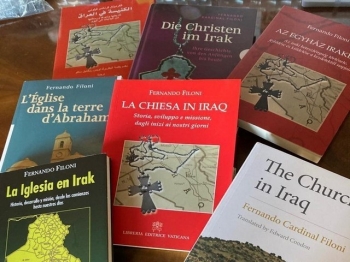A better understanding and love for the Church in Iraq
 The Church in Iraq by Cardinal Fernando Filoni, (CUA - The Catholic University of America Press, 2017)
The Church in Iraq by Cardinal Fernando Filoni, (CUA - The Catholic University of America Press, 2017)
In March Pope Francis goes to Iraq, offering the Grand Master of the Order the opportunity to draw members’ attention to that biblical land that welcomed the Gospel already in the apostolic era. Former apostolic nuncio to Iraq and author of a book on the Church in the land of Abraham (1), Cardinal Filoni - who accompanies Pope Francis during this journey as part of the papal delegation - shares some brief reflections below to help us better comprehend the journey in communion with the Christians of the Middle East.
Understanding the history of Christianity in the Middle East, and in particular Mesopotamia which is now Iraq, is not simply a superfluous academic exercise. It requires an understanding of the dramatic history of that region and an appreciation of the life, culture and testimony of faith of its Christians. Moreover, it demands that we comprehend what inspires their deep bonds with their homeland as well as the hatred of their enemies.
What transpires is the nobility of these people, forged by two fundamental realities: being a minority, which has generated a strong attachment to their own values, origin, and culture; and being the direct heirs of martyrs and confessors of faith, and consequently bearers of those values inherent in the faith of their fathers, which others cannot claim in the same way.
Those who have lived among them, or who have read and know their ways, cannot but love these people. Knowledge and understanding foster sharing and participation.
Their story is itself a victory over ignorance, marginalization, and intolerance; it is a call for respect and to not repeat the mistakes of the past. History tells how these communities have survived centuries of punitive taxation; of forced marriages and prohibitions; of intolerance, hate, and envy; and, finally, of persecution. These Christians have survived all of this, with incredible stamina, a genius for practical and cultural adaptation, and an unyielding faith.
This Christian community, as a community dating back to the Apostolic era, brings with it the accumulated inheritance of twenty centuries of love for Christ and the Church, and is willing to forsake everything, rather than kneel before the powers of the day. It is a heroic church, as Pope Benedict XVI and Francis have called it. Without it – and we may say this of all the churches of the Middle East, which have left similar footprints – the region would not be the same. This is without even thinking of the many other ethnic and religious minorities, often persecuted and suffering, in this land. This region is a mosaic of nationalities, religions, and confessions, without which it would have been destroyed forever; this truth is also recognized by eminent Muslim authorities, and even ordinary citizens, who have often repeated it to me. While this is truly positive, yet we must add to this the necessity of facilitating the permanent establishment and daily lives of these minorities.
When, on August 10, 2014, Pope Francis sent me as his personal representative to Iraq to encounter, to talk to, to see, to embrace, to pray with, and to stand in solidarity with the victims of the Islamic extremism of ISIS, it was a tremendously emotional experience.
Now, despite the insecurities and the pandemic that also afflicts Iraq, he has decided to go there himself. As the Chaldean Patriarch Card. Louis Sako said, the Pope is not going there to solve the many problems, but to give strength and reason to hope, to boost dialogue between Christians and Muslims and, at the same time, to encourage the commitment of the complex political reality. troubled by tribalism’s and internal and international interests. I am sure that a large part of the Iraqi people looks at this visit as a gesture of peace and solidarity.
Fernando Cardinal Filoni
(March 2021)
(1)The Church in Iraq by Cardinal Fernando Filoni, (CUA - The Catholic University of America Press, 2017).



